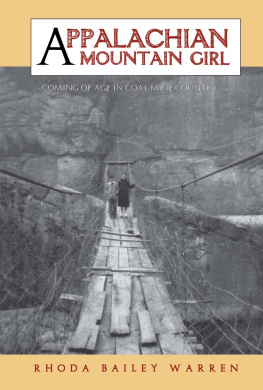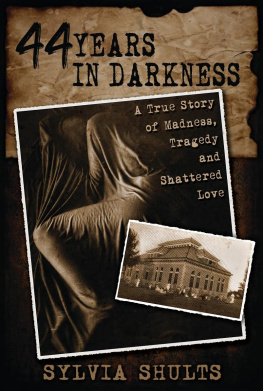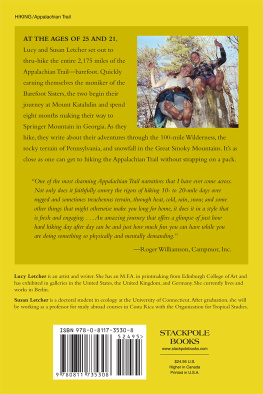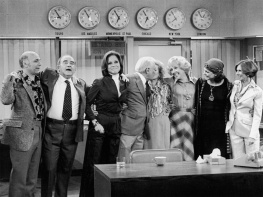

1998 Rhoda Bailey Warren
Published in 1998 by
Academy Chicago Publishers
363 West Erie Street
Chicago, Illinois 60610
All rights reserved.
Printed in the U.S.A.
No part of this book may be reproduced in any way without the express written permission of the publisher
Library of Congress Cataloging-in-Publication Data
Warren, Rhoda B.
Appalachian Mountain girl / Rhoda B. Warren
p. cm.
ISBN 0-89733-464-7
1. Warren, Rhoda B. 2. Letcher (Ky.)Biography. 3. Mountain lifeKentuckyLetcher Region. 4. Letcher Region (Ky.)Social life and customs. 5. Coal minersKentuckyLetcherBiography.
I. Title.
F459.L47W37 1998
976.9163043092dc21
[B]
98-26785
CIP
THIS BOOK IS DEDICATED TO MY PARENTS,
LAURA AND FRANK BAILEY
C ONTENTS

T he author wishes to thank the following individuals: Gilbert Jordan for his encouragement and support, Marsha Leuer, who invested many hours of typing and proofreading the manuscript, and my son Lewis Warren for his valuable assistance.
I NTRODUCTION

T he scenes in Letcher, Kentucky, after I went away hovered in the backroads of my memory, sometimes consciously, other times subconsciously, but always present at some level. Finally, I seemed compelled to put words to the memories.
From a distance, the sharp, jagged cliffs were softened, the wind blowing over the frozen ground was no longer cold and the once meager table was now more than ample.
Most of the people were now gone, but there, in an unusual gallery, I saw their portraits. They hung on the big trunks of the beech trees along the banks of Crases Branch in colors so muted and tones so subtle as to be almost invisible except in the clearest light.
At least that was the way it appeared in the outline to write these stories. But, then, the outline wasnt written by pen or paper. No, the outline for these stories flowed in my bloodstream.
Rhoda Warren
November 1998
C ORBIN GLOW

H eavy heat hung over the holler from wall to wall on the two mountains that faced each other across a narrow creek and the railroad track. The mountains were so high and steep that there was little more than a cleavage with no valley between them. The trees had been cut, leaving black jagged stumps everywhere.
The hillsides were covered in measured rows of two-and three-room houses made of rough lumber. Only the back walls of the houses rested on the ground. The front walls, to level them with the steepness of the hills, were propped on stilts six to eight feet high. Slimy green bald areas marked places where dishwater had been thrown from kitchen doors. Tin cans rolled as far as the nearest weed patch, where they heaped and caught a glint of the sun even as rust claimed them. A huge pile of blue-black coal lay in each yard, feeding hundreds of cookstoves which filled the air with gritty black smoke.
On one of the mountains was the black gaping maw of a coal mine, its dank cold breathing of the grave. While passersby moved out of its reach, the miners, with lowered heads and stooped shoulders, entered its darkness. A slate dump slid imperceptibly toward the creek in a gray scaly sheath of thin slabs of rock. Smouldering fire and smoke seeped from its edges, a fire no rain would be able to put out.
In this narrow cleft, the heat shimmered over a path of hot black cinders that lay alongside the railroad track; it also shimmered over the creek that floated a film of slow moving coal dust glinting in oily greens and blues. The rocks along the creek bed were a bright orangy-yellow. Their pitted surfaces, penetrated by iron and sulphur, gave them the powdery texture of crepe cloth.
The soundtrack for this nether world was a crashing, earsplitting racket made by tons of coal rolling down the mountain on the grinding gears of a conveyor until it plunged through a chute at a big tipple that straddled the railroad at the bottom. A huge iron railroad car, especially made for coal, sat beneath the chute and caught it from daylight to dark in a roaring crash of rock hitting metal.
Thick clouds of coal dust blown from this blasting inferno picked up an air current and floated off to settle on every leaf of every tree and bush it could reach. The leaves looked as if they had been brushed with gray paint by the hand of Death.
Hundreds of people were wedged in this place. The men were either in the mines or sleeping after the night shift. The women, surrounded by children, sat on porches fanning themselves in slow motion, their minds ponderingpondering only God knew what as they took in their surrealist surroundings.
There were no churches and no cemetery at this new place. The dead were shipped to relatives back home from where theyd come, making their last journey on the Louisville & Nashville passenger train.
This was in the dog days of August, 1930 at Corbin Glow, one of the newest and largest mining operations in southeastern Kentucky.
I sat expectantly on the narrow porch of our two-room house, waiting minute by minute for the siren to blow for the changing of the shifts in the mines. In the thick air it had a mournful wail, but its sound was the focal point of my day, all my days, in rain or shine, except in the winter when it would be dark, for the sound meant my father would be coming home. Hed left at dawn before Id awakened.
At the sound I ran off the porch and halfway up the narrow path that led to the mines. It had been trodden into the color and hardness of concrete by thousands of weary footsteps plodding up and down, to and from the mines. I stepped off it into weeds almost as high as I was and focused my eyes on that black hole in the hillside. The men came out of it half crouching as their heads barely cleared the damp, dripping, timbered roof. In single file they began a slow descent.
They all looked alike. Coal black from head to toe, they wore the same kind of work clothes, the same canvas caps that held a brass carbide lamp fastened to its visor and the same aluminum dinner buckets, in which the bottom half held water. As they slowly filed past, I searched each black face with its white-ringed eyes, trying to identify my father. At last, a figure stepped out of line and took me by the hand. My heart leapt in happiness as I took his empty dinner bucket to carry for him and we walked home with my hand in his.
One night that summer something like a bolt of lightning struck at the supper table. It shattered the house and it changed our lives. Mother began a response to something Father said and in mid-sentence started screaming, I cant stand another day in this place. Im not going to live here another day. Im not going to live here another day.
Another day. Another day. Fathers voice rose louder than hers as he mocked in anger: You cant stand it another day. I have no day. I crawl into that goddamned black hole before daylight and half the time I crawl out of that goddamned black hole after dark and you sit here and tell me that you cant stand it another
Next page















